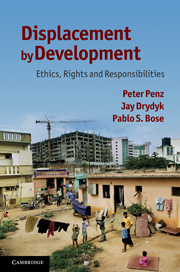Book contents
- Frontmatter
- Contents
- List of tables
- Acknowledgements
- 1 Introduction
- PART I FUNDAMENTALS
- PART II FROM COST–BENEFIT ANALYSIS TO ETHICS
- PART III FROM VALUES TO RESPONSIBILITIES
- 7 Ethical outcomes
- 8 Ethical procedures
- 9 From rights to responsibilities
- 10 International responsibilities and rights regarding displacement
- PART IV REALIZING RESPONSIBILITIES
- Bibliography
- Index
10 - International responsibilities and rights regarding displacement
Published online by Cambridge University Press: 05 June 2012
- Frontmatter
- Contents
- List of tables
- Acknowledgements
- 1 Introduction
- PART I FUNDAMENTALS
- PART II FROM COST–BENEFIT ANALYSIS TO ETHICS
- PART III FROM VALUES TO RESPONSIBILITIES
- 7 Ethical outcomes
- 8 Ethical procedures
- 9 From rights to responsibilities
- 10 International responsibilities and rights regarding displacement
- PART IV REALIZING RESPONSIBILITIES
- Bibliography
- Index
Summary
INTRODUCTION: INTERNATIONAL PARTICIPANTS IN DEVELOPMENT AND RESPONSIBILITIES
In the currently globalized economy, development agents are often foreign. Even when development was seen as essentially a national project in the hands of the state, there was international participation. Such participation comes from business organizations, development-funding and foreign-aid agencies and departments and non-governmental or voluntary organizations from other countries, and regional and global inter-governmental organizations. These players were deliberately omitted from the discussion in Chapter 9 to give special attention to them in this chapter. Why is this necessary? Don't all of these agents in the development process fall under the oversight responsibilities of the sovereign host state? That is certainly one position. However, we will argue that foreign participants in the development process have to attend to ethical requirements regarding displacement beyond the rules of the host state. This position is at times criticized as representing moral or more malign imperialism, especially when it involves conditions for making foreign development funds available. The focus of this chapter will therefore be on the tension between state sovereignty and the ethical responsibilities of foreign participants in the development process regarding displacement.
As in the earlier chapters, the guiding methodology will be the values that are being articulated in real-world development ethics. Although the values distilled in Chapter 6 do not refer to cross-border relations, other than the human-rights value which calls for international cooperation, in the next section different positions in international ethics will be identified.
- Type
- Chapter
- Information
- Displacement by DevelopmentEthics, Rights and Responsibilities, pp. 243 - 260Publisher: Cambridge University PressPrint publication year: 2011

